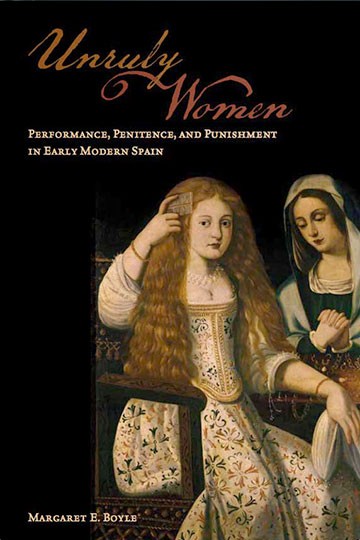
- Publisher: University of Toronto Press
- Available in: Paper,Cloth, ebook
- ISBN: 9781442646155
- Published: February 1, 2014
In the first in-depth study of the interconnected relationships among public theatre, custodial institutions, and women in early modern Spain, Margaret E. Boyle explores the contradictory practices of rehabilitation enacted by women both on and off stage. Pairing historical narratives and archival records with canonical and non-canonical theatrical representations of women’s deviance and rehabilitation, Unruly Women argues that women’s performances of penitence and punishment should be considered a significant factor in early modern Spanish life.
Boyle considers both real-life sites of rehabilitation for women in seventeenth-century Madrid, including a jail and a magdalen house, and women onstage, where she identifies three distinct representations of female deviance: the widow, the vixen, and the murderess. Unruly Women explores these archetypal figures in order to demonstrate the ways a variety of playwrights comment on women’s non-normative relationships to the topics of marriage, sex, and violence.
Honorable mention for Best Book of 2014, Society for the Study of Early Modern Women
Reviews
“Margaret Boyle has chosen a wonderful, timely topic for her monograph. Issues related to women’s punishment and the staging of female deviance are not well studied for Spain’s early modern period. Unruly Women will be of interest to early modernists as well as to colonial Latin Americanists and scholars interested in legal, religious, and performance history.”
Lisa Vollendorf, Dean of the College of Humanities and Arts, San José State University
“Margaret Boyle’s lucid and concise study of misbehaving women in early modern Spain is the perfect scholarly blend of real-life rule-breakers and the professional actresses who played them on stage. Unruly Women problematizes the complex ways in which early modern spectators made sense of women who committed violent acts or disregarded norms for sexual conduct. In doing so, Boyle invites her readers to consider how rehabilitation and punishment of rebellious women was a nuanced and contested process of both performance and negotiation, whether in a magdalen home, women’s jail, or popular entertainment.”
Sherry Velasco, University of Southern California
‘Unruly Women provides a strong foundation from which to build a more nuanced understanding of the engendering of early modern women’s roles and behaviors in Spain. This brief volume makes its argument with great clarity; it will be useful to both graduate students and scholars of early modern Spanish cultural studies.’
Stacey Schlau, Renaissance Quarterly vol 68:02:2015
‘Unruly Women deftly explores the relationships between historical recogidas and the fictional female protagonists of the comedia… It will be of interest to scholars and teachers of early modern theater, history, and women’s studies.’
Emily C. Francomano, Hispania vol 98:02:2015
‘Unruly Women provides readers with enough valuable insights on early modern judicial and rehabilitative practices to make it well worth the read.’
Barbara Mujica, Modern Philology vol 112:04:2015